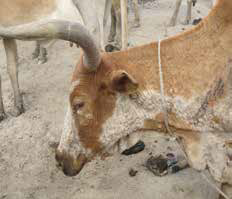FAO - Emergency Prevention System for Animal Health: Lumpy Skin Disease
In an ever changing global environment, under the pressure of climate change and movements of people, goods and animals over long distances, the invasion of new and emerging animal diseases, in areas where they never occurred before, is no longer an exceptional event. Vector-borne diseases, in particular, hold a prominent place in the list of these “newcomers”. Their mode of transmission (arthropods) greatly reduces the potential for intervention by veterinary authorities. Lumpy Skin Disease (LSD) is a typical example of such an “exotic” disease that entered continental Europe for the first time in 2015. Within less than a year, it turned into a regional crisis involving many countries in the Balkan peninsula. There are several lessons learnt from the incursion of LSD in Europe. For this reason, FAO-Emergency Prevention System for Animal Health (EMPRES-AH) has recently published a special issue on Lumpy Skin disease (LSD). In this issue the tools to tackle new challenges on LSD are reported in details. The contents are:
The disease
Epidemiological situation
Coordination: Regional and international intervention and cooperation
News
The document can be view and downloaded at the following address: http://www.fao.org/3/a-i7982e.pdf
Reference: FAO. 2017. EMPRES-Animal Health 360, No. 47. Rome.
© IZSAM October 2017
|
|
Istituto Zooprofilattico Sperimentale
dell'Abruzzo e del Molise "G. Caporale"
Campo Boario | 64100 TERAMO | ITALIA
Telefono 0039.0861.3321 | Fax 0039.0861.332251
e-mail: archivioeprotocollo@izs.it
Posta elettronica certificata: protocollo@pec.izs.it
Partita IVA: 00060330677
Codice Fiscale: 80006470670



